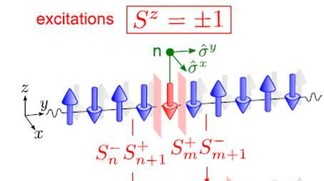Jun 17 2013
Scientists at EPFL have made a breakthrough into the properties of quantum magnets that can impact our understanding of fundamental physics.
 © 2013 EPFL
© 2013 EPFL
Antiferromagnets are materials that lose their apparent magnetic properties when cooled down close to absolute zero temperature. Different to conventional magnets, which can be described with classical physics even at the atomic level, antiferromagnets such as copper sulfate are quantum systems where electrons behave in a complex cooperative manner. They belong to the field of quantum many-body physics, a branch of science that studies the collective behavior of vast assemblies of interacting particles. Thus far, only very few exact solutions to quantum many-body problems are known and even fewer have been realized experimentally. In a recent publication in Nature Physics, scientists from EPFL’s Laboratory for Quantum Magnetism (LQM) have together with collaborators from Institut Laue Langevin and the University of Amsterdam have measured the collective quantum-mechanical magnetism in crystals of copper sulfate and show how it relates to properties of sub-electron quasiparticles known as spinons.
Copper sulfate pentahydrate is a commonplace material that is often used to keep swimming pools clear of algae. Because it easily grows as large crystals, it is also very popular in schools’ chemistry classes where many students across the world have been inspired by their beautiful and intense blue color. But copper sulfate has some other fascinating properties that most of us might not realize.
When cooled down close to absolute zero temperature, this material hosts a fascinating state of matter called a “quantum spin-liquid”. Magnetism essentially originates from a material’s electrons spins, sometimes referred to as magnetic moments. When conventional magnets (such as ferromagnets) are cooled down to low temperatures, their electrons’ spins align together in a simple static pattern. In contrast, in a quantum spin-liquid state like discovered in copper sulfate, the electrons’ spins are interrupted from lining up by quantum fluctuations. This causes the spins to constantly change direction as the molecules floating in a liquid. Despite of this constant change in direction, they remain correlated over long distances, a property that is known as quantum entanglement and which is the key property scientist’s hope will lead to future quantum computers.
The LQM scientists, led by Henrik M. Rønnow, cooled down a copper sulfate crystal close to absolute zero (about 0.01 K) to turn it into a quantum spin liquid and then used inelastic neutron scattering to investigate the motion of electrons’ spins. The experiments reveal that the magnetic properties of copper sulfate can no longer be described by the individual behavior of the magnetic moments carried by each individual electron in the sample. Instead, flipping the magnetic moment of one single electron creates two spatially separated quantum objects called spinons.
The accuracy of the experiments made it possible to detect not only such spinon-pairs but even splitting (also called fractionalization) into four-spinon states. By carefully accounting for the intensity of their experimental signal, the EPFL team thereby proved and quantified the actual existence of states composed of more than two spinons. Their paradigm-shifting discovery is not only expected to affect future physics textbooks, but, more importantly, allows researchers to develop a simple picture for understanding multi-particle excitations in quantum systems.